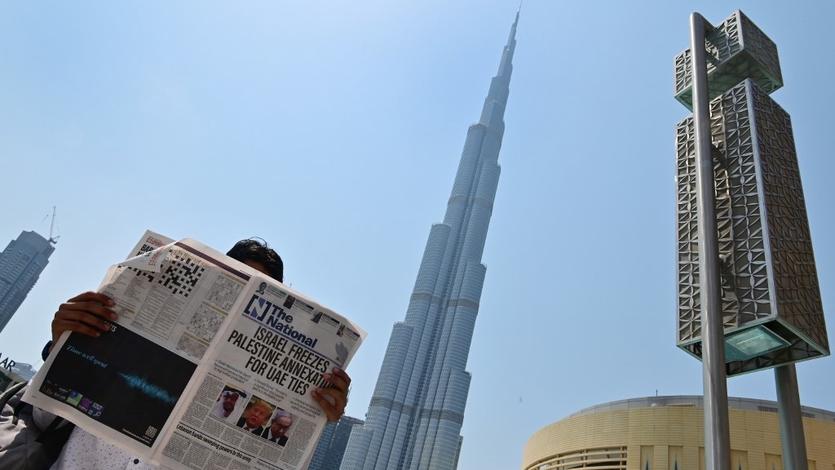 A man reads a copy of UAE-based The National newspaper near the Burj Khalifa, the tallest structure and building in the world since 2009, in the gulf emirate of Dubai on August 14, 2020, as the publication's headline reflects the previous day's news as Israel and the UAE agreed to normalize relations in a landmark US-brokered deal. (GIUSEPPE CACACE / AFP)
A man reads a copy of UAE-based The National newspaper near the Burj Khalifa, the tallest structure and building in the world since 2009, in the gulf emirate of Dubai on August 14, 2020, as the publication's headline reflects the previous day's news as Israel and the UAE agreed to normalize relations in a landmark US-brokered deal. (GIUSEPPE CACACE / AFP)
ABU DHABI / JERUSALEM - Peace moves between Israel and the United Arab Emirates gathered pace as Israeli President Reuven Rivlin invited UAE Crown Prince Mohammed bin Zayed to visit Jerusalem, while technology and aviation companies announced tie-up plans.
In his letter to the prince, Rivlin said the two countries had embarked on a process that he hoped would “set our region forward and bring economic well-being and provide prosperity and stability to the people of the Middle East as a whole”
In his letter to the prince, Rivlin said the two countries had embarked on a process that he hoped would “set our region forward and bring economic well-being and provide prosperity and stability to the people of the Middle East as a whole.”
READ MORE: UAE's Israel deal met with Arab dismay but quiet welcome in Gulf
Israel’s technology minister on Monday predicted imminent collaboration with the Gulf Arab nation in cyber security and space research.
“The timelines are quite immediate,” Izhar Shay said on Monday in an interview on Bloomberg TV. Israel will benefit from UAE investment while sharing its “vast amount of intellectual property with our new friends in the Emirates,” he added.
Dubai-based Emirates airline said it was looking into starting flights to Israel if demand allows, and Israir Airlines Ltd has started applying for a landing permit in the UAE. Israeli Prime Minister Benjamin Netanyahu said he’s trying to arrange permission for flights to cross over Saudi Arabia so they can travel direct.
The kingdom currently doesn’t allow Israeli airlines to pass over its territory though in recent years it has permitted flights bound for or leaving Israel to enter its airspace.
On Sunday, the UAE summoned a senior Iranian diplomat on Sunday following a peace accord between Israel and UAE even as Tel Aviv said Bahrain and Oman could follow in the UAE's footsteps in formalizing ties.
UAE's Ministry of Foreign Affairs and International Cooperation summoned a senior diplomat from the Iranian embassy in Abu Dhabi over its president's speech following the Israel-UAE peace accord.
Iran's charge d'affairs was called to the ministry, and Khalifa Shaheen Al Marri, UAE's deputy minister of foreign affairs and international cooperation for political affairs, handed him a strong note of protest against the "threats contained in Iranian President Hassan Rouhani's speech regarding the UAE's sovereign decisions," according to the official WAM news agency.
READ MORE: UAE's Israel deal met with Arab dismay but quiet welcome in Gulf
The ministry considered the speech "unacceptable and inflammatory and had serious implications for security and stability in the Gulf region."
The note warned of Iran's responsibility to protect the UAE mission in Tehran and its diplomats in accordance with the Vienna Convention on Diplomatic Relations in the light of precedents of attacks on foreign diplomatic missions in Iran.
The UAE affirmed its absolute rejection of "the language of inflammatory speeches delivered by the Iranian authorities" following the peace accord reached between the UAE, Israel and the United States, considering this "an interference in its internal affairs and an attack on its sovereignty."
Iranian President Hassan Rouhani on Saturday condemned the move of UAE to establish diplomatic ties with Israel as "a betrayal of the cause of the Palestinian nation," Tasnim news agency reported.
ALSO READ: Israel, UAE shares climb after historic deal reached
Both Bahrain and Oman praised the US-sponsored accord, but neither have commented on their own prospects for normalized relations
Bahrain and Oman could be the next Gulf countries to follow the United Arab Emirates in formalising ties with Israel, Israel’s intelligence minister said on Sunday.
“In the wake of this agreement will come additional agreements, both with more Gulf countries and with Muslim countries in Africa,” Intelligence Minister Eli Cohen told Army Radio.
“I think that Bahrain and Oman are definitely on the agenda. In addition, in my assessment, there is a chance that already in the coming year there will be a peace deal with additional countries in Africa, chief among them, Sudan,” he said.
Both Bahrain and Oman praised the US-sponsored accord, but neither have commented on their own prospects for normalized relations or responded to requests for comment on the subject.


